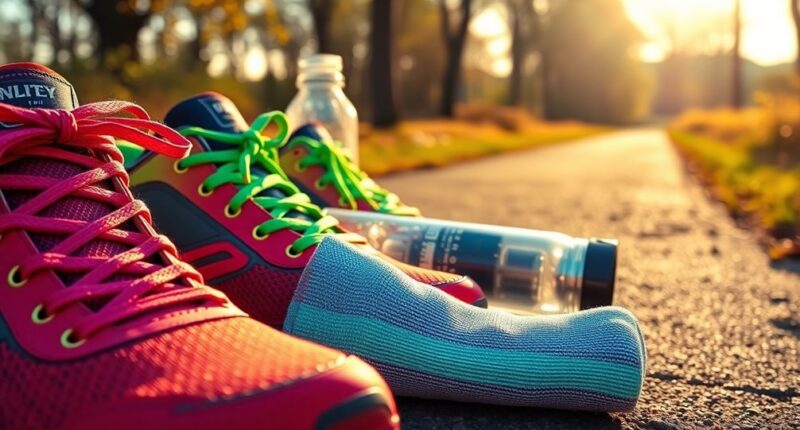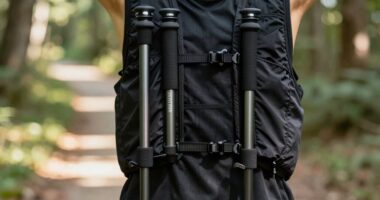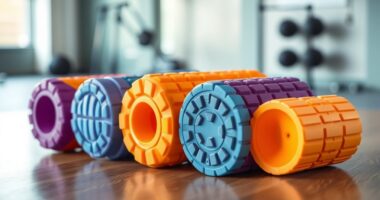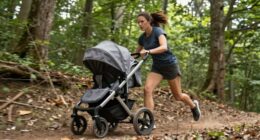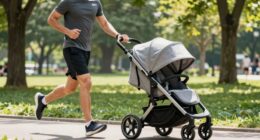To keep your running gear in top shape, make sure you rotate between shoes, wipe them down after each use, and store them in a cool, dry place. Check for signs of wear before every run and follow specific cleaning guidelines to avoid damage. Maintain your headphones and recovery items by regularly cleaning and storing them properly. With these simple tips, your gear can last longer and perform better. There's even more to discover about enhancing your gear's longevity.
Key Takeaways
- Rotate running shoes regularly for optimal drying and recovery to extend their lifespan.
- Clean gear after each use and store in a cool, dry place to prevent degradation.
- Inspect all gear for wear and damage before each use to ensure safety and effectiveness.
- Invest in high-quality, eco-friendly gear made from sustainable materials for durability.
- Follow specific care instructions for washing and maintaining your gear to preserve performance.
Help Your Running Gear Go the Distance
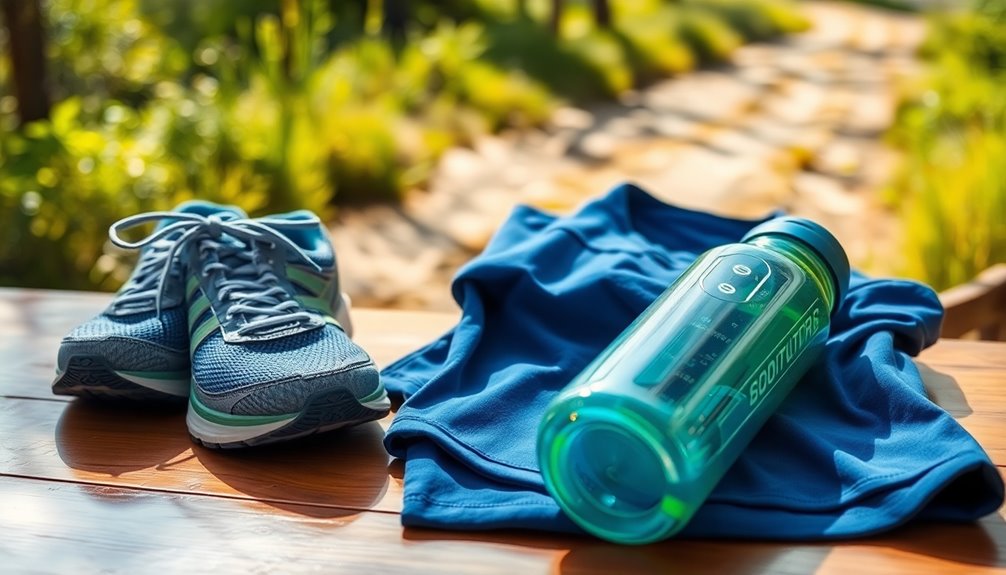
To maximize the lifespan of your running gear, it's essential to adopt a few simple maintenance practices.
First, rotate between two or more pairs of running shoes to allow for full drying and recovery, helping them last longer.
When removing your shoes, always untie the laces and loosen them to prevent stretching and maintain their original fit.
After each run, wipe down your shoes instead of tossing them in the washing machine, as that can damage their structure.
Store your shoes and workout clothes in a cool, dry place, away from sunlight, to prevent degradation.
Finally, follow the specific care instructions—like using a gentle cycle with cold water when washing—to enhance the durability and performance of your running gear.
What to Look for When Buying New Gear
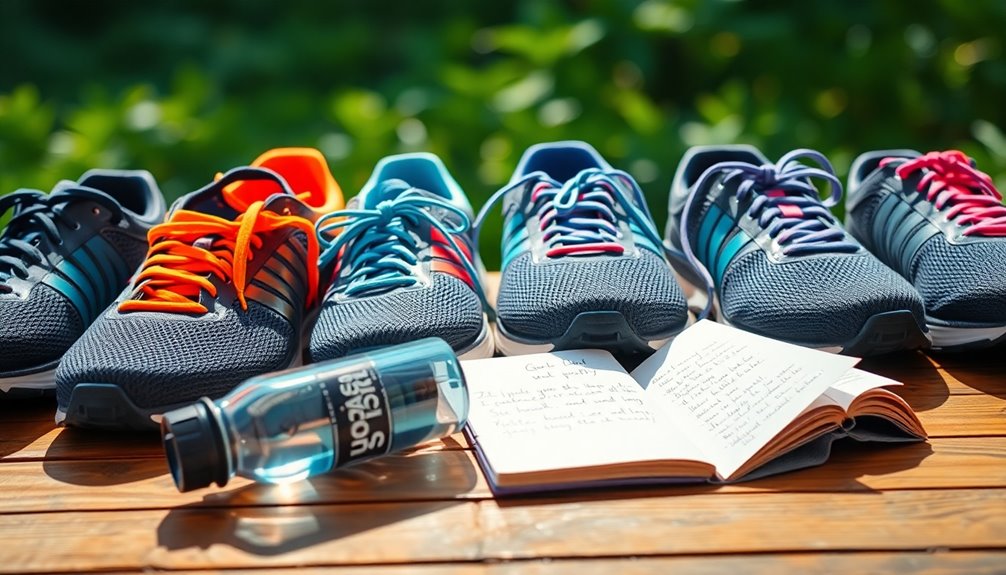
Maintaining your running gear is just one part of the equation; knowing what to look for when buying new gear is equally important.
Start by prioritizing eco-friendly options made from sustainable materials like organic cotton and recycled polyester. Check the craftsmanship—inspect stitching and seams to ascertain durability during your runs.
Choose brands that are transparent about their sustainability practices; this helps you align your purchases with your values. Aim for products with at least 50% recycled or bio-based content to lessen your environmental impact.
Don't forget to invest in performance-driven gear, such as the Ghost 15 shoes, which are made with 90% recycled materials and contribute to net-zero carbon emissions goals by 2040.
Our Commitment to Sustainability
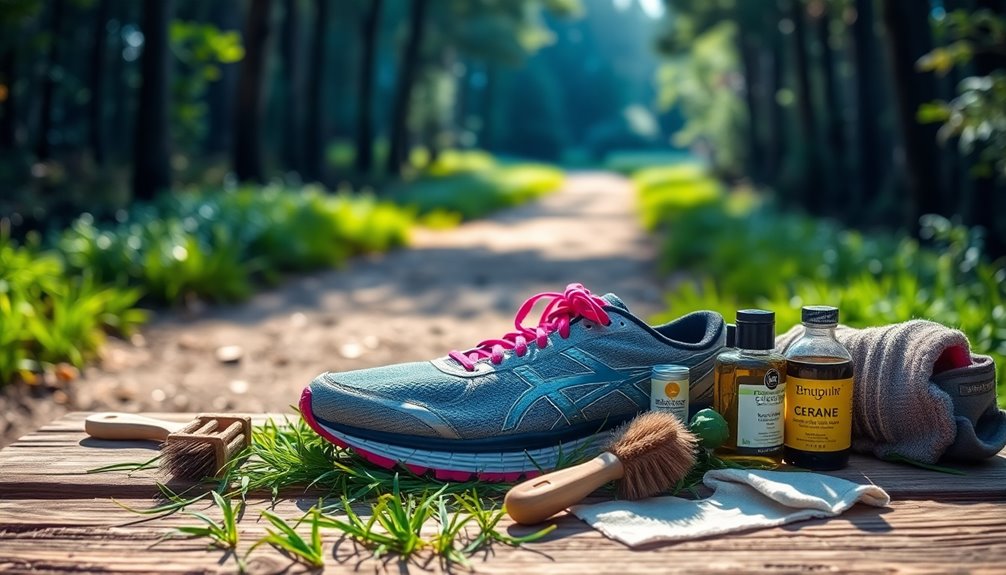
When you choose running gear, you’re not just picking performance; you’re also supporting sustainability. Brands like Brooks are committed to sourcing materials with at least 50% recycled content and launching fully circular footwear by 2030. Additionally, investing in solar energy solutions can further enhance your eco-friendly lifestyle while reducing your carbon footprint. Together, we can promote eco-friendly practices in our running community. By opting for ecofriendly running gear options, you are making a conscious choice that contributes to a healthier planet. Every step taken in responsibly designed apparel not only boosts your performance but also signals a commitment to environmental stewardship. Let’s inspire others in the community to prioritize sustainability and embrace innovations that allow us to run with purpose and care for the Earth.
Sustainable Materials Sourcing
As consumers become increasingly aware of their environmental impact, Brooks is dedicated to sourcing materials that reflect a commitment to sustainability. By 2030, Brooks aims to have at least 50% of its materials made from recycled or bio-based content. This initiative not only enhances performance but also reduces waste.
| Material Type | Recycled Content | Bio-Based Content |
|---|---|---|
| Polyester | 50% | 20% |
| Rubber | 30% | 15% |
| Foam | 60% | 10% |
| Fabric | 40% | 25% |
Brooks is also focused on eliminating manufacturing waste sent to landfills, reinforcing their dedication to sustainable materials and practices in every aspect of production.
Circular Footwear Initiatives
Building on our commitment to sustainable materials, Brooks is excited to introduce our Circular Footwear Initiatives. By 2030, we aim to launch fully circular performance running footwear and clothing, integrating sustainable materials and advanced recycling processes.
Our goal is to eliminate waste from footwear manufacturing, ensuring nothing ends up in landfills or incineration. We're committed to sourcing materials with at least 50% recycled or bio-based content, considerably reducing our environmental footprint.
To further this mission, we've implemented a product take-back program, encouraging you to return used footwear for recycling and repurposing.
These initiatives reflect our broader commitment to achieving net-zero carbon emissions by 2040, focused on responsible manufacturing and material use for a sustainable future.
The Carbon-Neutral Ghost 15

With sustainability at the forefront of running gear innovation, the Ghost 15 stands out as a prime example of how eco-friendly practices can enhance performance.
Crafted from recycled materials, including a 90% recycled content vamp mesh, this shoe not only supports your runs but also cares for the planet.
As Brooks' second carbon-neutral product, it embodies the brand's commitment to achieving net zero carbon emissions by 2040.
By utilizing carbon credits to offset remaining emissions, the Ghost 15 contributes to climate change mitigation efforts.
With a goal to source at least 50% recycled or bio-based materials by 2030, you can trust that your choice in the Ghost 15 reflects a sustainable future for running gear. Additionally, the shoe aligns with the growing trend of sustainable transportation solutions, showcasing the industry's shift towards environmentally-friendly practices.
More Miles, Less Impact
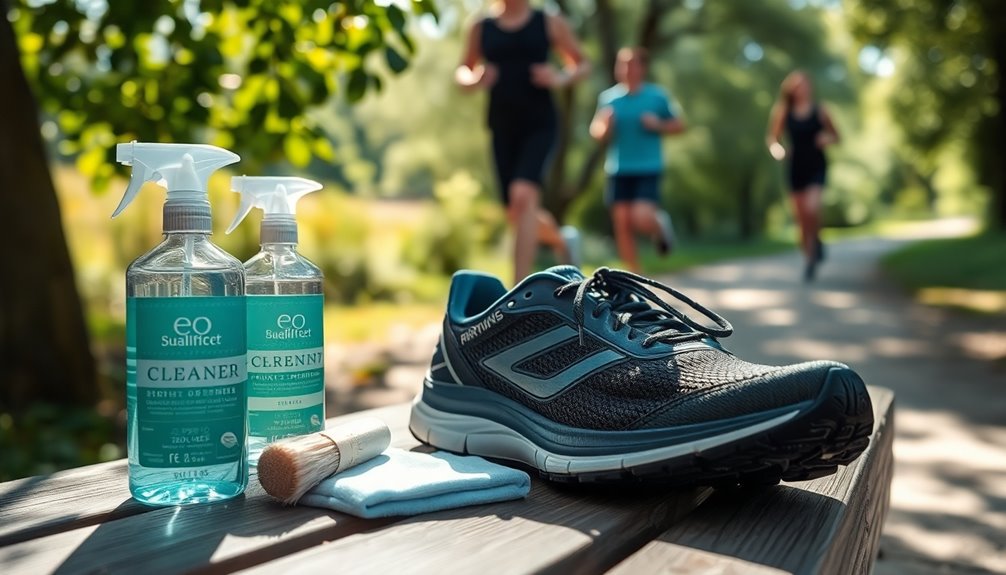
While you focus on logging those miles, it's essential to reflect on how to make each run more sustainable. By extending the lifespan of your running gear, you can reduce waste and lessen your environmental impact.
Here are some tips to keep in mind:
- Rotate between multiple pairs of shoes to allow them to recover.
- Wash your gear with cold water to prevent shrinkage and preserve materials.
- Choose apparel made from sustainable materials, like those with 50% recycled content.
- Participate in product take-back programs to recycle worn-out gear.
- Regularly maintain your gear to enhance durability and performance.
These small, consistent actions can lead to significant positive changes for both your gear and the planet.
Pro Care Tips for Your Gear

To guarantee your running gear stays in top shape, it's crucial to implement a few pro care tips.
First, rotate between two or more pairs of running shoes to allow for full drying and recovery, enhancing their lifespan and performance.
When washing your gear, always follow care instructions, typically using a gentle cycle with cold water to prevent damage and maintain integrity.
Store your gear in a cool, dry place away from sunlight to prevent deterioration.
Regularly inspect your gear for wear and tear, addressing issues like fraying seams promptly.
Finally, wipe down your shoes after each use and avoid washing machines to protect their structure, ensuring they remain supportive and effective during your runs.
Headphones and Earbuds Maintenance
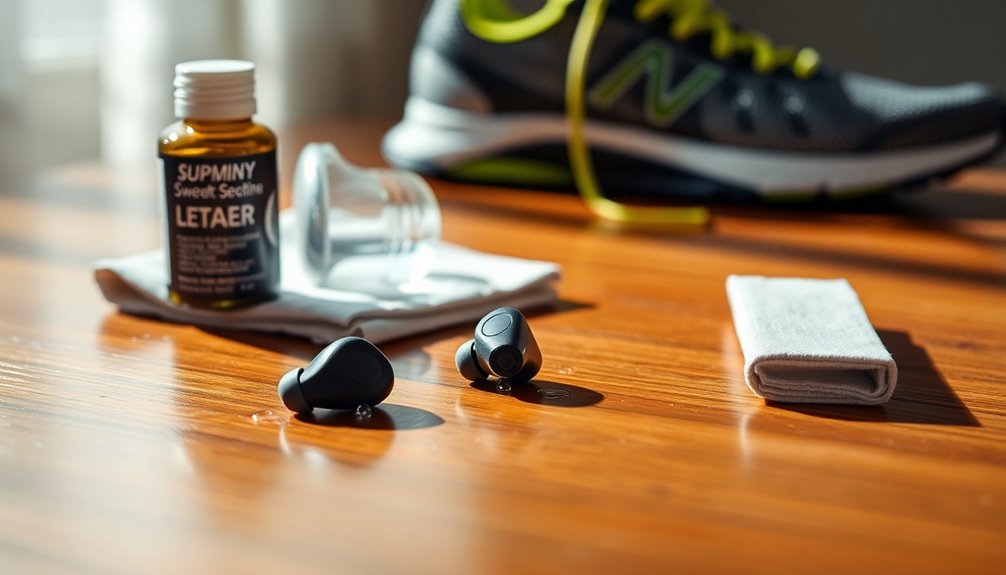
Maintaining your running gear isn't just about shoes and apparel; your headphones and earbuds also need care to guarantee peak performance.
Water and sweat can damage your audio gear if you don't take a few precautions. Here are some essential maintenance tips:
- Wipe your headphones and earbuds dry with a microfiber cloth after each use.
- Ascertain charging ports are completely dry before plugging in.
- Store your headphones and earbuds in a protective case when not in use.
- Turn off your headphones when they're not in use to save battery life.
- Consider models like Shokz OpenRun, designed to withstand moisture and temperature extremes.
Foam Rollers and Recovery Items Care
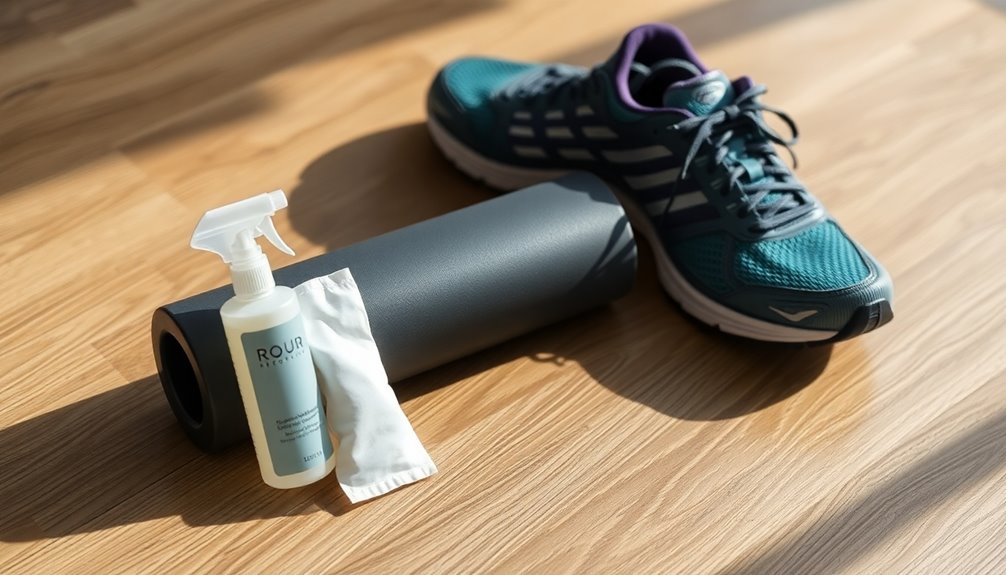
To keep your foam rollers and recovery items in top shape, make a habit of cleaning them regularly and storing them properly.
Always check for any signs of damage before each use to guarantee your safety and the effectiveness of your gear.
Regular Cleaning Routine
- Wipe down foam rollers and recovery items with a wet cloth regularly.
- Adhere to weight-limit guidelines, like the 360-pound limit for the TriggerPoint MB1 Massage Ball.
- Inspect for puncture marks or signs of wear.
- Replace or repair items showing signs of damage.
- Store foam rollers in a cool, dry place to prevent moisture or heat damage. Additionally, maintaining a regular review of your gear's condition can help catch potential issues early.
Proper Storage Techniques
If you want to keep your foam rollers and recovery items in great condition, proper storage is essential. Start by regularly wiping them down with a wet cloth to prevent dirt and bacteria buildup. Always adhere to weight-limit guidelines to guarantee safe use. Store your items in a cool, dry place, avoiding heat and moisture that can degrade materials. Utilize appropriate storage solutions that allow for ventilation, preventing mold growth. Here's a quick reference table for your storage needs:
| Storage Tips | Do's | Don'ts |
|---|---|---|
| Clean Before Storage | Wipe with a wet cloth | Store dirty items |
| Check for Damage | Inspect for punctures | Ignore wear signs |
| Choose Location | Cool, dry space | Humid or hot areas |
| Use Storage Solutions | Bins or shelves for air | Tight, closed containers |
| Adhere to Weight Limits | Follow item guidelines | Exceed recommended limits |
Inspect for Damage
Regularly inspecting your foam rollers and recovery items is essential for maintaining their effectiveness and safety. Small damages can compromise usability, so make it a habit to inspect for damage.
Here's what to look for:
- Puncture marks or cracks
- Signs of deformation or loss of firmness
- Adherence to weight-limit guidelines (e.g., TriggerPoint MB1 Massage Ball: 360 pounds)
- Cleanliness of surfaces; wipe down after each use
- Proper storage conditions, avoiding heat and moisture
Durable Gear Recommendations
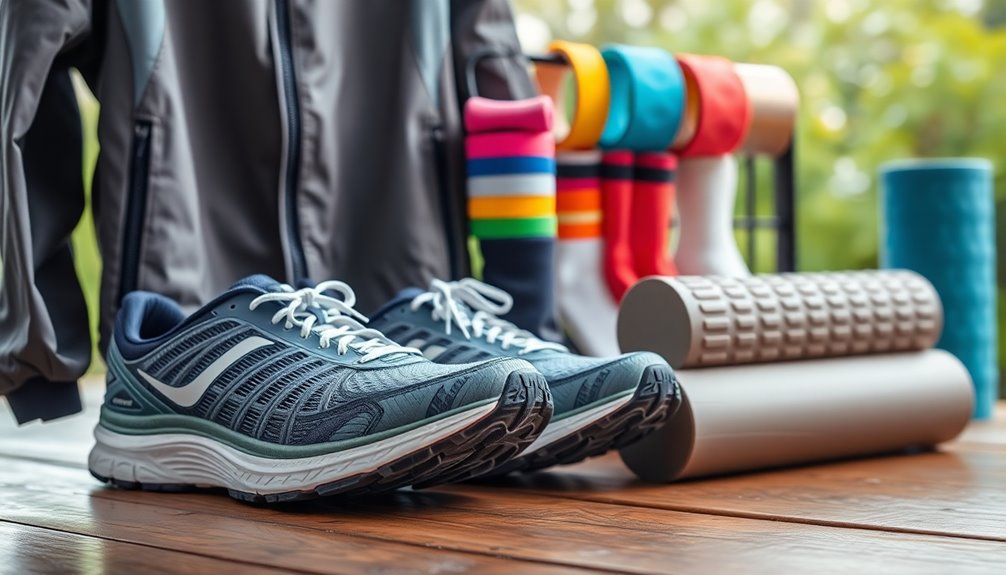
When you're investing in running gear, durability should be a top priority to guarantee it withstands the rigors of your training.
For hydration, consider the Nathan QuickShot Plus Hydration Flask at $37. It's designed to prevent freezing, making it reliable all year round.
The Saucony Skyrocket Bra, available for $40, offers exceptional support for various cup sizes, ensuring comfort during your runs.
For bottoms, Hoka Performance Knit 3-inch Shorts at $52 are engineered for long-lasting wear.
Under Armour ColdGear Leggings, priced at $35, have proven their durability over a decade.
Finally, opt for Darn Tough Press Crew Socks, which last up to five years and come with a lifetime guarantee.
These selections embody essential tips for longevity in your running gear.
Frequently Asked Questions
What Is the Lifespan of Running Shorts?
The lifespan of your running shorts usually ranges from 6 to 12 months.
This varies based on how often you wear and care for them. If you notice signs of wear like fading, thinning fabric, or stretched elastic, it's likely time to replace them.
Washing in cold water and avoiding harsh detergents can help them last longer.
Store your shorts in a cool, dry place away from sunlight to maintain their quality.
How Long Should Running Leggings Last?
You wouldn't want to wear leggings that look like they've been through the Renaissance fair!
Typically, running leggings last around 6 to 12 months, depending on how often you use 'em and how well you care for them.
To extend their life, wash 'em in cold water, check for wear, and store 'em away from sunlight.
Investing in quality brands can also make a big difference in durability and performance.
Conclusion
By taking care of your running gear, you not only enhance your performance but also extend its life. Did you know that properly maintained running shoes can last up to 800 kilometers? That's a lot of miles! So, treat your gear with respect—clean your shoes regularly, store them properly, and follow maintenance tips. With a little effort, you can keep your favorite gear in top shape, ensuring every run feels great and lasts longer. Happy running!
